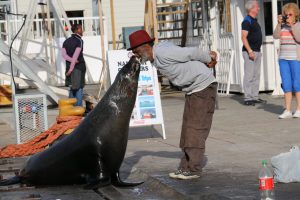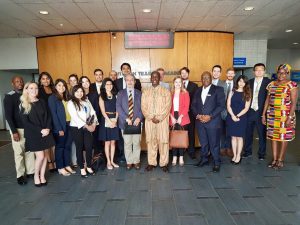August 10, 2017
This post was submitted by Bryan Flynn during the course Business & the State: Privatization & Public-Private Partnerships, a short-term study away program and part of his MS in Government Contracts degree.

My enduring impression of the study abroad visit to the United Kingdom (U.K.) is stepping into the whirlwind of Brexit, and feeling like our class lucked into this unexpected turn of events. It is rare that we get to step into history. The vote and the reaction to it could be felt everywhere and in all our activities, like an anxious overlay to everything we saw and did. There was a perplexed atmosphere that only deepened over our week there. I met a few pro-Brexiters and far more anti-Brexiters, and it was fascinating to observe the quarrels. I find myself wondering how different the trip would have been if Brexit had failed. Would it have been discussed at all? Would our speakers have touched on “what could have been” in their presentations, or let it be as a foregone conclusion run its course? We will never know.
It was also obvious in many of our sessions that the insecurity fostered by the Brexit vote was a real problem for our hosts, and the disrupted strategies it creates in the short-term (regulations, market uncertainties, political turmoil) are going to cause complications down the road. This sense of uncertainty was equally palpable on the Tube and in the pubs and restaurants, where a generation of Anglo-Europeans share concerns about the possible loss of mobility, upset plans and relationships, and a sense of bewilderment that their country rejected their point of view. I consider the visit to Parliament and House of Lords particularly memorable given the situation, and how the leadership of the Conservatives and Labour parties were imploding in tandem with our time there.
Beyond Brexit, this was also my first time employing the London Underground. My initial expectations of similarities to U.S. systems were lost to the reality that most Londoners rely on the public transportation far more than we do in the U.S. I was told by a new acquaintance that most Londoners could afford no other way to get around.
I was equally amazed at the sprawl of London. Some of my classmates and I were astonished on our trip back from Cambridge that what felt like entering London was in fact 15 miles from Regents Park. I suppose a city as old as London could never easily be retrofitted with highways, but the marked lack of infrastructure when compared to the U.S. was noticeable.
What I Learned in London
The Brexit quarrels colored much of the experience for me, but there were some solid lessons to be drawn from our presenters and speakers. The notion of “good value for money” applied to areas I did not expect in U.K. public sector, such as security and military spending. The embrace of privatization was expected but still a fascinating contrast to the more familiar U.S. approach where privatization is rare because many services and industries began as private entities.
My impression of public private relationships in the U.K. is that after 20 years the approach is accepted for new ventures, but privatization of existing public assets is contentious in some quarters. I felt there was a societal question of what should be public and what private. The rolling stock and infrastructure of the London Underground could be privatized, but not the Underground itself. Perhaps there is too much history and national pride in an asset such as this to hand over to private industry?
Contrast this notion with the gondola we saw in North Greenwich, which was conceived as a privately financed venture with sponsorship in return for branding rights. It plays a role in gentrification projects on both sides of the Thames. I think it an interesting, and in the long-term, probably successful venture that makes good use of public and private capabilities. My impression is the U.K. sees private enterprise in new ventures as an opportunity to capture market efficiencies and private investment, but is less certain with privatizing and handing over existing public assets to private ownership.
Impressions of Our Speakers
I appreciated the diversity of our speakers and their preparedness for our class. There was a lot of material presented in a short period of time, and while many of these points were topical to my team project, we suffered from a lack of context in some areas. I found Sir Devane’s presentation on the British Council’s soft power fascinating. However, the contrasts with Lt. Col. Waite-Robert’s presentation on U.K. military privatization were fascinating. You can outsource hard power but not soft.
My most favorable impressions were on Tuesday when we met with Cat Hobbes and KPMG. There was that contrast of a one-woman movement pressing against privatization, followed by the corporate finesse of KPMG and Dr. Murphy’s team of public-private partnership (P3) experts. I understood from my classmates that they found Ms. Hobbs’ presentation weak, but I thought she did very well driving her point on ownership of her country’s public assets. In many ways her position is the more conservative in the P3 argument (although I wonder if she would see it that way), a fact I think often lost because it rejects profit-driven performance.
Impressions of My Classmates
A week with spent in a small group participating in the same learning experience is a good opportunity to learn about each other. There was a good deal of discussion outside of our visits, particularly in regards to the speakers. The mix of public administration and government contracts experience provided interesting perspectives on the course material. Also of interest was the mix of government employees and private sector students, so when we discussed the rail presentations there were countervailing perspectives on topics such as economic development, utilities oversight and the role of the public sector in pricing.
Many of my classmates preferred the enjoyment of each other’s company instead of mixing. However I preferred making acquaintances with the locals. It provided a great deal of satisfying conversation and a few new contacts in London. The topics of Brexit and the U.S. presidential election were always the first topics discussed but there was also great interest on the part of the Londoners I met with regard to our class and purpose of visit. It all provided excellent perspective on the U.K. and its relationships with the U.S. and Europe, and I believe many of my classmates missed good opportunities to learn local points of view.
Impressions of the Class
I thought the class was excellent and informative, and overall offered me a singular opportunity to learn about many aspects of the U.K. I found the structure and pacing of the class worked well, and the wide-ranging subjects presented to us over the week interesting and topical to the course material. My impression is I received a crash course in the U.K.’s character as much as I learned about P3, the former of which informed my perspective of the latter.
It would have been beneficial to get perspective on other issues such as nationalization. The bank nationalizations that occurred during the Great Recession and the re-nationalization of some National Rail routes would have been of interest. My research into the nationalization question on the take-home exam piqued my interest the role of government with banks.
Overall I was very pleased with the visit abroad and will retain great fondness of the memories of our time spent there. So many fascinating moments, like witnessing the House of Lords in session to attending Henry V in the rain will not easily come again.









